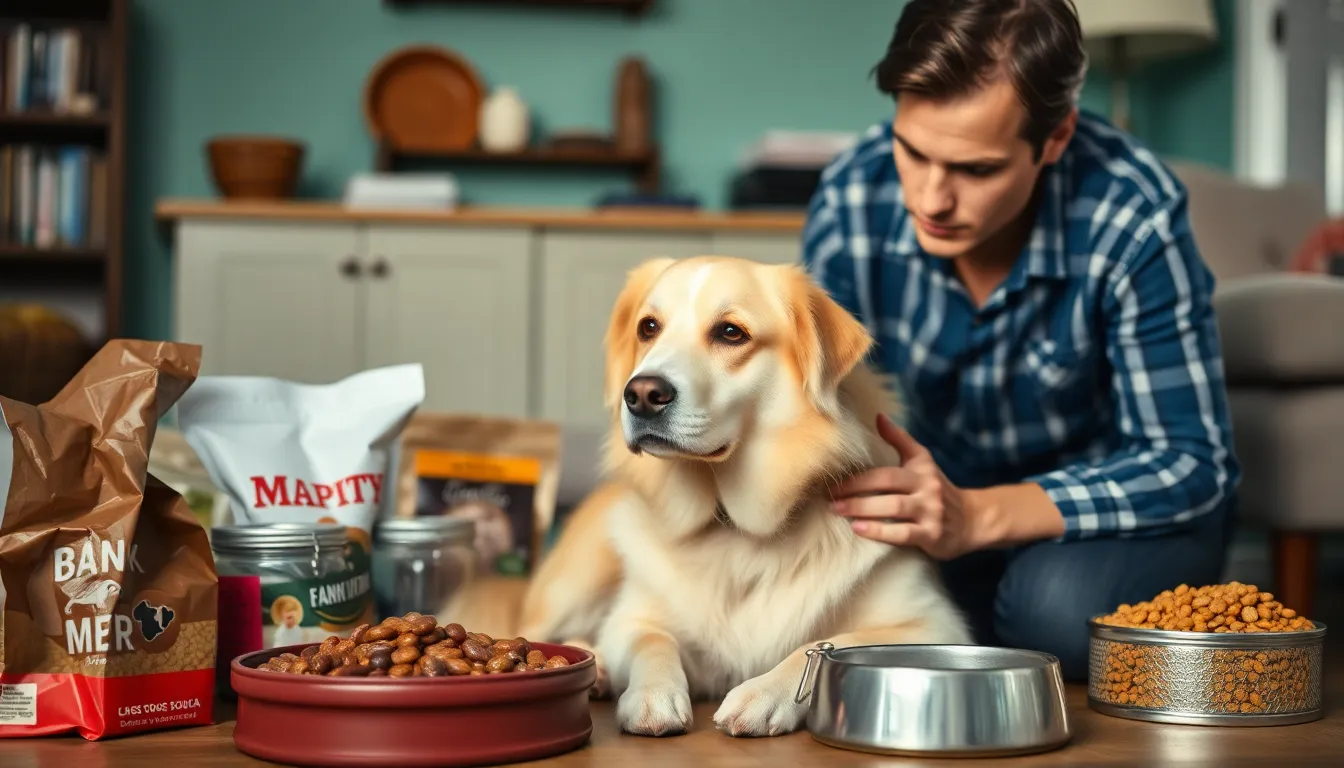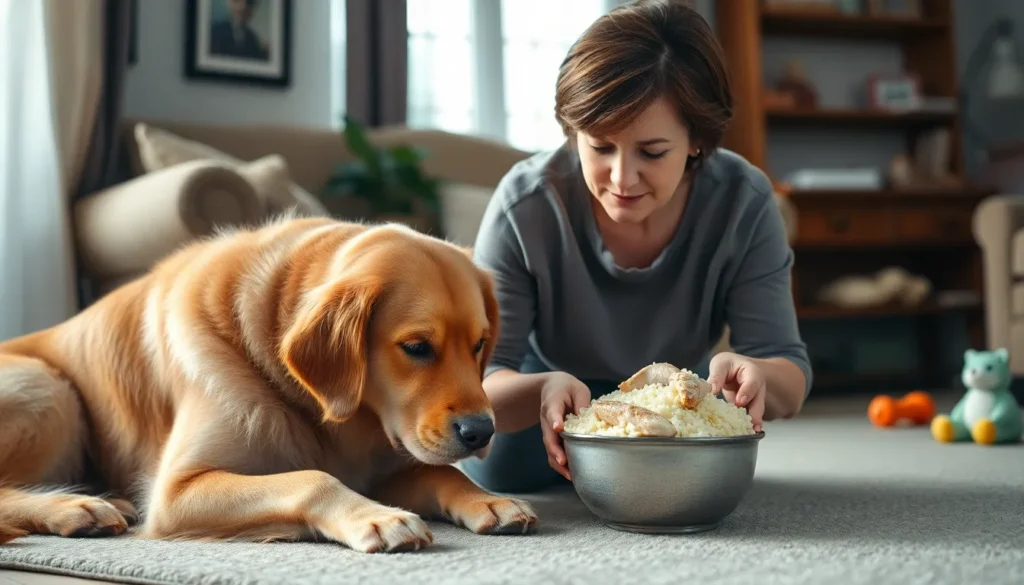Table of Contents
ToggleWhen a dog’s tummy goes on the fritz, it can feel like a race against time for every dog parent. Diarrhea isn’t just a messy inconvenience; it can leave pups feeling low and their humans frazzled. But fear not! The right diet can help turn things around faster than a squirrel can scamper up a tree.
Understanding Diarrhea in Dogs
Diarrhea in dogs often indicates an underlying health issue. It can arise from various causes, including dietary changes, infections, parasites, or stress. Symptoms to watch for include frequent, watery stools and increased urgency to go outside. Dehydration is a serious risk associated with diarrhea, as it can lead to significant health problems if untreated.
Veterinarians categorize diarrhea into two types: acute and chronic. Acute diarrhea occurs suddenly and lasts for a short period, often resolving itself quickly. Chronic diarrhea persists for more than two weeks and generally requires veterinary intervention for diagnosis and treatment.
When assessing your dog’s condition, factors such as age, breed, and overall health play roles. Young puppies and older dogs tend to be more vulnerable to dehydration and related complications. Monitoring dietary habits may reveal links between food and diarrhea. Changes in diet, introduction of new treats, or consumption of table scraps can trigger gastrointestinal disturbances.
Impacted dogs may display additional symptoms like vomiting, lethargy, or loss of appetite. In these cases, contacting a veterinarian is essential. Your veterinarian may recommend diagnostic tests to identify specific issues, including fecal examinations or blood tests.
A proper diet has the potential to help alleviate diarrhea. Providing bland, easy-to-digest foods can assist in restoring gut health. Options like boiled rice and plain chicken are commonly recommended. Gradually reintroducing regular dog food can also help transition back to a normal diet.
Causes of Diarrhea in Dogs

Diarrhea in dogs can result from various factors. Understanding these causes can help dog owners manage their pets’ digestive health effectively.
Dietary Causes
Changes in food can lead to gastrointestinal upset. Introducing new treats or sudden dietary changes often result in diarrhea. Dogs may also react negatively to low-quality ingredients in commercial dog food, especially those with fillers. Additionally, certain human foods are not suitable for dogs and can cause digestive issues. Rich, fatty meals frequently trigger diarrhea as well. Dogs with food allergies may exhibit these symptoms when exposed to specific proteins or additives. Identifying which foods are causing the issue often requires careful observation and elimination.
Environmental Causes
Environmental factors can significantly influence a dog’s digestive health. Stress arising from changes in routine or surroundings often leads to diarrhea. Additionally, contamination from spoiled food or water can cause gastrointestinal infections. Exposure to parasites like giardia or roundworms is another common cause. Dogs may ingest harmful substances during walks or while playing outdoors, resulting in digestive disturbances. Keeping a close eye on a dog’s environment helps prevent these issues and supports overall well-being. Regular vet check-ups can help identify potential environmental threats that may contribute to diarrhea.
Foods to Feed Dogs with Diarrhea
Focusing on easy-to-digest foods can promote recovery from diarrhea in dogs. Certain bland diet options can soothe an upset digestive system.
Bland Diet Options
Boiled rice serves as an excellent foundation for a bland diet. Plain, skinless chicken or turkey complements the rice, offering protein without added fats. Cooked pumpkin, without any spices, also helps firm up stools due to its fiber content. Mashed sweet potatoes provide additional nutrients while remaining gentle on the stomach. Gradually introducing these foods can ease the transition back to regular dog food.
Hydration Importance
Maintaining hydration is crucial for dogs experiencing diarrhea. Frequent bouts lead to increased fluid loss, making dehydration a significant concern. Offering fresh, clean water at all times ensures access to essential fluids. Adding an electrolyte solution specifically designed for pets can further assist in replenishing lost nutrients. Monitoring water intake helps gauge hydration levels, allowing for timely intervention if needed.
Foods to Avoid During Diarrhea
Certain foods can further complicate a dog’s diarrhea. Identifying and avoiding these foods can assist in the recovery process.
High-Fat Foods
High-fat foods create challenges for a dog’s digestive system, especially when diarrhea occurs. These foods can lead to increased pancreatic stress, worsening gastrointestinal upset. Sources of high-fat content include fatty meats, oils, and processed snacks. Owners should always opt for lean proteins if they choose to give their dogs any meat during this time. A dog’s gastrointestinal tract requires easier nutrients, making low-fat diets preferable until recovery is achieved. Monitoring any fat levels in food can help return the dog’s digestion to normal.
Dairy Products
Dairy products often pose significant issues for dogs, particularly if they experience diarrhea. Many dogs lack the necessary enzymes to digest lactose, leading to further gastrointestinal distress. Foods like milk, cheese, and yogurt can create additional symptoms such as gas and bloating. Avoid giving dairy during digestive troubles to minimize discomfort. In addition, the potential for allergic reactions exists, complicating matters further. Keeping meals free from dairy helps maintain a balanced recovery as the dog’s digestive system heals.
When to Consult a Veterinarian
Consulting a veterinarian becomes crucial if a dog experiences diarrhea persisting longer than 24 hours. Prolonged diarrhea raises concerns about dehydration and underlying health issues. Notably, symptoms accompanying diarrhea, such as vomiting, lethargy, or a loss of appetite, warrant immediate veterinary attention.
Signs of dehydration, including dry gums, excessive thirst, and reduced urination, require prompt evaluation by a professional. Young puppies, older dogs, and those with pre-existing medical conditions are particularly at risk and need careful monitoring.
A sudden change in behavior or failure to respond to home treatment after 48 hours signals that veterinary intervention is necessary. Additionally, if the diarrhea appears bloody or is mixed with mucus, this condition demands swift assessment.
Environmental factors, such as potential exposure to toxins or infectious agents, can complicate a dog’s health and require a vet’s insight. Immediate consultations help to prevent worsening conditions and ensure the dog receives proper care.
Maintaining open communication with a veterinarian during a pet’s recovery can assist in monitoring progress and adjusting treatment plans as needed. Utilizing veterinary expertise ensures that both the dog’s health and overall well-being remain prioritized.
Addressing a dog’s diarrhea requires careful attention to diet and hydration. Providing bland and easily digestible foods can significantly aid in recovery while avoiding problematic items is crucial. Monitoring symptoms and hydration levels helps ensure the dog’s well-being during this challenging time. If diarrhea persists or is accompanied by other concerning symptoms, seeking veterinary advice is essential for proper care. By staying vigilant and responsive, dog owners can help their pets return to health and comfort more quickly.








